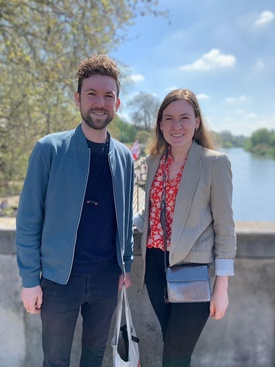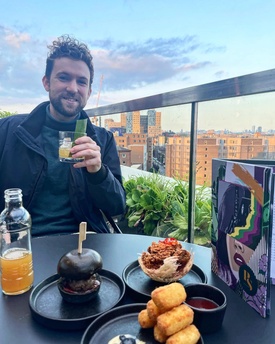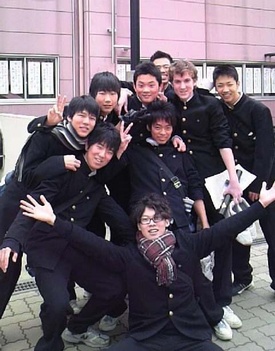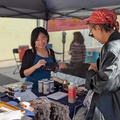My grandparents came to Japan
One day, a conversation between a white man and an African-American woman came up in the recommended videos on YouTube. I started watching it as recommended, and before I knew it, I had finished watching the 26-minute video.
What was interesting about the video? First of all, both the white man who started the video, Joshua Thompson, and the guest, Tiffany, spoke Japanese at a native level. And judging from their appearances, the two were clearly "not Japanese," but they had actually grown up in Japan (meaning they were native Japanese speakers). Joshua's video really conveyed the "diversity of Japan that is rarely shown on the surface."
After discovering Joshua's videos, I continued to watch his video series " Joshua in London, " in which he invites guests from various backgrounds, all of whom were born and raised in Japan. This helped me to understand who Joshua himself is.
His grandparents, both on his father's side and on his mother's side, were Protestant Christian missionaries who came to Japan in the 1950s and 1960s. His paternal grandfather was from Australia and his maternal grandfather was from New Zealand, but Joshua himself is a British citizen. This is because Joshua's father was born in London, the hometown of Joshua's paternal grandmother, and thus became a British citizen.
Joshua was born in Tokyo in the 1990s and grew up in Saitama Prefecture, where he attended a Japanese public elementary school, an international school for junior high school, and a public high school in his home prefecture of Saitama.
Value obligation and human feelings
After watching the video, I wanted to dig deeper into Joshua's identity, so I decided to interview him, who currently lives in London. The first question I asked him was, "Who do you think you are?"
"How I introduce myself depends on who I'm talking to. If a British person asks me, I'll say, 'I'm from Tokyo, I grew up in Japan,' and if the person I'm talking to is Japanese, I'll say, 'I'm British but grew up in Japan.'"
Next, I asked, "When did you realize that you were different from the Japanese people around you?"
"Actually, I lived in America from the age of three to five, and that's when I thought, 'I'm from this country.' But Japanese was constantly a part of my life. My parents spoke Japanese, and relatives came to visit from Japan. After that, I returned to Japan and learned Japanese from my mother at home for a year, before joining the older children's group at kindergarten. At kindergarten, other children would say things like, 'Joshua, why are your eyes different?' and 'Your hair is different,' and I began to realise that even though my family wasn't Japanese, we were living in Japan."
In other words, Joshua seemed to feel like he didn't belong in Japanese society.
He recalls that he was able to overcome that sense of alienation when he was attending public high school.
"My friends in high school were like, 'You're a foreigner, so what?' and they just accepted me. I went to an international school in middle school, but I had trouble speaking to people in English and realized I felt more comfortable around Japanese people. I think that's probably because my sense of humour is Japanese.
But then when I was in high school, I started watching a TV show called "The OC" set in America, and I started to think that English was great. That made me want to connect more with my roots, and to do that, I started to think that I wanted to enjoy English."
After that, Joshua moved to London in 2022 after working as a model and other entertainment professionals. What are the Japanese and non-Japanese aspects of himself that he now feels are unique to him?
"The Japanese are polite in everything they do. They also value obligations and human feelings in human relationships. I think British people are lax in that area. They're weak at connecting with other people. Also, Japanese people are good at listening to others. I'm the same. At school (in Japan), we're thoroughly taught to 'listen to others'.
On the other hand, the thing that makes me un-Japanese is that I didn't grow up in a Japanese household, so I don't fully understand Japanese events and customs. For example, when I go to a friend's house and see a Buddhist altar, I realize, 'That's Japanese. I'm not Japanese.'"
I want to convey the world that Japanese people don't know about through videos
Joshua was born and raised in Japan, but he has always switched between Japanese and English, and between Japanese and non-Japanese parts, but he admits that something changed when he came to England.
"When I'm in Japan, people always see me as 'Joshua the foreigner.' But coming to the UK has strengthened my sense of self-worth and taught me to love myself. At the same time, by going outside of Japan, I've learned the real reason why foreigners want to come to Japan. Before, I thought it was because it's a novelty that's different to the West, but now I understand that it's the depth of Japanese culture, including the delicacy of Japanese cuisine, that's what attracts me."
Joshua says that in the future he would like to use his videos to convey information about the world that Japanese people don't know about.
"Japan is becoming like the Galapagos, and I feel that if things continue like this, it will be left behind by the rest of the world. The reason I upload videos is because I want to help tell people in Japan about a world that they don't know about. I would be happy if people who watch my videos can gain new values."
YouTube: " Joshua in London "
Instagram: @jj.jj.7
© 2023 Keiko Fukuda








